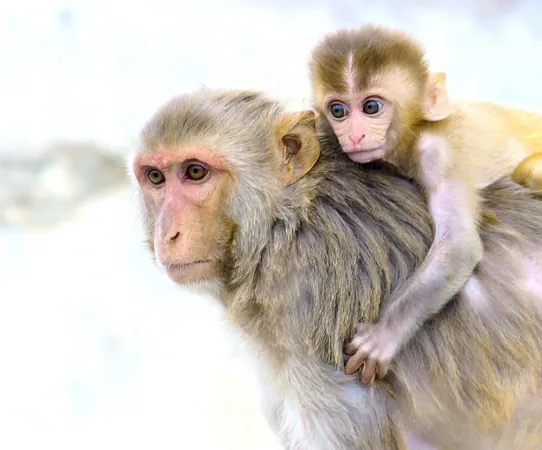
Macaque Mothers Experience Grief Differently Than Humans: Groundbreaking Findings
2025-04-16
Author: Benjamin
A Surprising Study Unveils Unique Maternal Responses to Infant Loss
In a captivating new study conducted by UCL anthropologists, it has been revealed that bereaved macaque mothers exhibit a distinct response to the loss of their infants that starkly contrasts with human grief behaviors. Rather than displaying the typical signs of lethargy and appetite loss that humans often experience during mourning, macaque mothers go through a brief period of physical restlessness after their infant’s death.
Restlessness Over Lethargy: The Macaque Mourning Process
Published in the journal Biology Letters, the study highlights that these bereaved macaques spent significantly less time resting in the two weeks following their infant’s passing compared to their non-bereaved counterparts. This period of increased activity may symbolize a primal instinct of 'protest,' reminiscent of maternal responses observed in studies regarding infant separation among primates.
Groundbreaking Research on Animal Grief
This research marks a pioneering exploration into whether primate mothers experience grief similarly to humans. With scarce empirical studies on how animals respond to death, these findings shed light on the emerging field of evolutionary thanatology—the study of death and mourning across species. Dr. Alecia Carter, a co-author of the study, expressed surprise at the findings, stating that they had anticipated increased resting time among mourning macaque mothers.
Methodology: Observing Macaque Behavior in the Wild
The study involved behavioral observations of 22 macaque mothers at the Caribbean Primate Research Center on Cayo Santiago, Puerto Rico. Half of the mothers had experienced recent infant loss, while the other half served as a control group. Researchers meticulously categorized and tracked behaviors such as resting, feeding, grooming, and various displacement behaviors using smartphones and specialized software over a 16-day period.
A New Understanding of Grief: What This Means for Animal Behavior
Lead author Emily Johnson emphasized the varying responses to death among species, suggesting that grief may not be exclusive to humans. While anthropologists have long debated the existence of grief-like behaviors in animals, the perceptions of pet owners often influence these discussions. Johnson noted that what may seem like grieving behavior could simply be a response to the loss of companionship, intertwining human emotions with animal behavior.
Implications for Understanding Grief Across Species
These findings open up a rich dialogue about the complexity of grief and how it manifests across different species. Distinguishing between bereavement—the state of losing a loved one—and grief—the emotional response—can lead to deeper insights into the emotional lives of animals. As research continues, the question remains: is grief a uniquely human phenomenon, or do other species experience it in their own ways?









 Brasil (PT)
Brasil (PT)
 Canada (EN)
Canada (EN)
 Chile (ES)
Chile (ES)
 Česko (CS)
Česko (CS)
 대한민국 (KO)
대한민국 (KO)
 España (ES)
España (ES)
 France (FR)
France (FR)
 Hong Kong (EN)
Hong Kong (EN)
 Italia (IT)
Italia (IT)
 日本 (JA)
日本 (JA)
 Magyarország (HU)
Magyarország (HU)
 Norge (NO)
Norge (NO)
 Polska (PL)
Polska (PL)
 Schweiz (DE)
Schweiz (DE)
 Singapore (EN)
Singapore (EN)
 Sverige (SV)
Sverige (SV)
 Suomi (FI)
Suomi (FI)
 Türkiye (TR)
Türkiye (TR)
 الإمارات العربية المتحدة (AR)
الإمارات العربية المتحدة (AR)